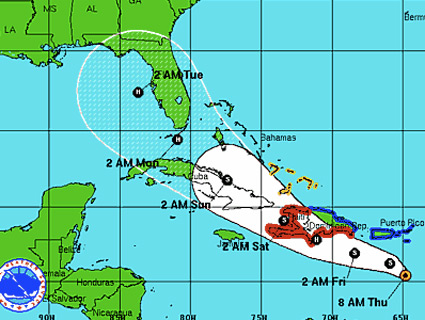Update, October 29, 12:29 a.m. EST: With Hurricane Sandy set to make landfall in the Mid-Atlantic, Mitt Romney’s policies for federal emergency management seem as relevant as ever. And the candidate’s budget, as described below, isn’t the only indication Romney would slash funding: As the Huffington Post‘s Ryan Grim noted, the presidential candidate suggested during a GOP primary debate that he would diminish the agency’s role and leave responsibility for helping imperiled Americans to the states:
When Republicans gather in Tampa next week for their national convention, they may have some unwelcome company. No, not Ron Paul’s army of supporters—Tropical Storm Isaac, which is currently winding its way through the Caribbean, is expected to pick up hurricane status and slam into South and Central Florida—directly into Tampa, according to at least one model. What that means for the convention is unclear, but since a direct hit would likely flood most of the city, organizers, city and state officials, and relevant federal agencies are planning accordingly. The Federal Emergency Management Agency has downplayed the threat to the city, but is reportedly preparing to mobilize to assist in the disaster response in South Florida, should that become necessary.
But under a Mitt Romney and Paul Ryan administration, FEMA’s ability to respond quickly and effectively to natural disasters could be severely inhibited. In a 2012 report on Rep. Paul Ryan’s “Path to Prosperity” roadmap (which Romney has said is similar to his own), the nonpartisan Center on Budget and Policy Priorities noted that, due to the severe cuts to nonentitlement, nondefense spending, the costs for things like emergency management would have to be passed on to the states—which, with just a few exceptions, are currently in an even tighter financial bind than Washington.
“FEMA also helps states and local governments repair or replace public facilities and infrastructure, which often is not insured,” the CBPP report explained. “This form of discretionary federal aid would be subject to cuts under the Ryan budget. If it were scaled back substantially, states and localities would need to bear a larger share of the costs of disaster response and recovery, or attempt to make do with less during difficult times.”
The Ryan budget makes no mention of FEMA or the Department of Homeland Security of which it’s a part. In fact it makes no mention of any specific cuts to non-entitlement programs. We can’t say for sure, in other words, the extent to which disaster funding would be scaled back. But the overall math suggests that it would be drastic. The Ryan budget proposes reducing total non-entitlement spending from 12 percent of GDP to 3.5 percent of GDP by 2050. As my colleague Kevin Drum put it:
Defense spending alone amounts to 4% of GDP, and it’s vanishingly unlikely that this will ever fall much below 2-3% of GDP. This means that all domestic spending will decline from about 8% of GDP to 1-2% of GDP by 2050. That’s prisons, border control, education, the FBI, courts, embassies, the IRS, FEMA, housing, student loans, roads, unemployment insurance, etc. etc. It’s everything. Whacked by about 80% or so.
Romney’s own proposed budget (which like Ryan’s fails to identify specific cuts) would create much the same bind. Between 2013 and 2022, Romney would cut between $2 to $5 trillion more than Ryan from programs other than Social Security or defense. As the CBPP noted, “Romney’s cuts would shrink non-defense discretionary spending…to between 1.1 percent and 1.6 percent of GDP.” That’s on top of the scheduled cuts agreed to in last year’s budget deal.
Just as Ryan’s proposed Medicare expenditure would fail to keep up with rising medical costs, the GOP ticket’s likely cuts to disaster management and weather forecasting budgets would come at a time in which, fueled by climate change, natural disasters are becoming increasingly more potent and expensive. There were 14 billion-dollar disasters in the United States in 2011—the most on record. For the GOP in Tampa, Hurricane Isaac isn’t just a nuisance; it’s the elephant in the room.













